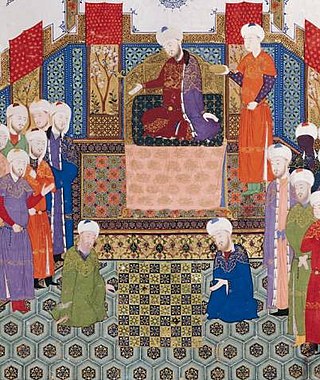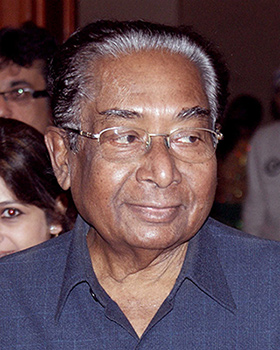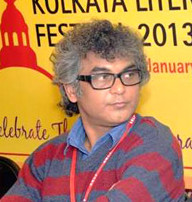
Shatranj is an old form of chess, as played in the Sasanian Empire. Its origins are in the Indian game of chaturaṅga. Modern chess gradually developed from this game, as it was introduced to Europe by contacts in Muslim Al-Andalus and in Sicily in the 10th century.

The Cox–Forbes theory is a long-debunked theory on the evolution of chess put forward by Captain Hiram Cox (1760–1799) and extended by Professor Duncan Forbes (1798–1868).

Chaturanga is an ancient Indian strategy board game. It is first known from India around the seventh century CE, but its roots may date 5000 years back, to the Indus Valley Civilization.
Chess is a two-player board game.
Shatranj Ke Khilari is a 1924 Hindi short-story written by Munshi Premchand. Premchand also made the Urdu version titled "Shatranj ki bazi".

Indian chess is the name given to regional variations of chess played in India in the 18th and 19th centuries. It is distinct from chaturanga. There are several such variations, all quite similar to modern rules, with variants regarding castling, pawn promotion, etc. These variants were popular in India until the 1960s. However, even today a mix of Indian and international rules and terminology are used in some parts of India.

Sachin Bhowmick was an Indian Hindi film writer and director. Writing was his main work and he wrote stories or screenplays for over 94 films. He is best remembered for directing the light romantic black comedy classic Raja Rani (1973). He was also a regular contributor to Ultorath, a Bengali magazine on cinema. Due to the Bengali pronunciation of his surname Bhaumick we will find his surname spelled as Bhowmick in numerous sites.
Chadarangam is a Telugu version of Indian chess, Chaturanga. It became very famous among kings and courtesans. Previously chariots (Ratha) were used in warfare, but in medieval times chariots were replaced by camels (Oṣṭra). So, the bishop in olden days was called Ratha / Śakaṭa and in medieval ages was called Oṣṭra.

Shatranj Ke Khilari, also subtitled and later internationally released with the translated title The Chess Players, is a 1977 Indian film written and directed by Satyajit Ray, based on Munshi Premchand's short story of the same name.
Khatron Ke Khiladi (transl. Daredevil) may refer to:

Suman Mukherjee is an Indian film director.His popular films are Herbert (film), Kangal Malsat, Shesher Kobita (2014).
Soumendu Roy was an Indian cinematographer most known for his work with noted director Satyajit Ray's films, starting with Teen Kanya (1961), when Subrata Mitra developed an eye-problem, though he has earlier shot Ray's documentary Rabindranath Tagore (1961) and has been an assistant to Subrata in post Pather Panchali films.
The 26th Filmfare Awards were held in 1979.
Chaturanga is a novel by Rabindranath Tagore, widely considered a landmark in Bengali literature. The novel was published in 1916. The story of the novel follows the journey of a young man named Sreebilas, his meeting with his best friend, philosopher and guide Sachis, the story of Damini a widow and Jyathamoshai, an idealist person.
The ferz or fers is a fairy chess piece that may move one square diagonally. It was used in orthodox chess and in Shatranj form of chess before being replaced by the queen.
Saeed Jaffrey OBE 1929 - 2015) was a British-Indian actor who worked in numerous British and Indian movies. His film credits include The Man Who Would Be King (1975), Shatranj Ke Khiladi (1977), Gandhi (1982). His brief filmography is given below.

The pil, alfil, alpil, or elephant is a fairy chess piece that can jump two squares diagonally. It first appeared in shatranj. It is used in many historical and regional chess variants. It was used in standard chess before being replaced by the bishop in the 15th and 16th centuries.

Anand Neelakantan an Indian novelist, columnist, screenwriter, and public speaker. He is known for writing mythological fiction and has authored 15 books in English and one in Malayalam. He has been writing a column in the The New Indian Express since 2017.

Avtar Gill is an Indian actor who appears predominantly in Hindi and Punjabi language 13 films and television serials. He has done many plays with Indian People's Theatre Association Mumbai.

Chokher Bali is a 1903 Bengali novel by Rabindranath Tagore that revolves around the central character Binodini and her relationships with three individuals. It explores the extramarital affair between Binodini, a young widow, and Mahendra, an old suitor of hers, the complicated friendship with Asha, Mahendra's wife, and her mutually conflicting feelings with Behari, Mahendra's childhood best friend. The novel also highlights issues of female literacy, child marriage, patriarchy within the family, and the fate of widows during that era.










